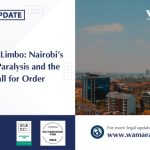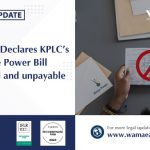(An Analysis of the Classical Case of Paul Muhoro Kihara vs Barclays Bank (K) Ltd, Milimani HCCC No.33 of 2002 (2001) 2EA 420)
Brief Background
Paul Muhoro Kihara (hereinafter referred to as “Paul”) was an employee of Barclays Bank of Kenya (hereinafter referred to as “the Bank”). In 1988, he borrowed the sum of Kshs.649,000.00 while he was in the employment of the Bank to purchase a property known as Nakuru/Langalanga/321 (hereinafter referred to as “the Property”). He secured the mortgage facility by charging the Property. The said Property was also where Paul and his family obtained rental income.
After some time, Paul failed to service the loan and fell into arrears. Consequently, he was duly served with the requisite statutory notices indicating the Bank’s intention to exercise its power of sale. In a bid to prevent the sale of the property, he filed an Application for an interlocutory injunction to restrain the Bank from selling the property pending the hearing and determination of the suit.
The Court considered the two principal issues in making its determination in this instant case. Of relevance among the two was whether or not the Plaintiff is entitled to a temporary injunction in lieu of the principles in Giella v Cassman Brown & Co. Ltd [1973] E.A. 358.
Holding and Rationale
It is trite law that the conditions as exposited in Giella v Cassman Brown Co. Ltd 1973 E.A. 358 have to be met before the Court can grant an interlocutory injunction. These conditions include:
- An applicant must show a prima facie case with a probability of success;
- Unless the application is granted, the Applicant might otherwise suffer irreparable harm which would not adequately be compensated by an award of damages; and
- If the court is in doubt, it will decide an application on a balance of convenience.
Whilst considering whether the Applicant (Paul) had met the 2nd condition of risk of irreparable loss, the court held as follows:
“To my mind a person who offers his property as security for a borrowing does so knowing only too well that in the event of default in repayment of the loan such property will be sold. To put it another way, to offer a property as security for a loan is to convert it into a commodity for sale. And there is no commodity for sale whose loss cannot adequately be compensated in damages. Such is the case here. The open market value of the plaintiff’s property is said to be Kshs.1.5. million according to the notification of sale thereof. That is an amount I am sure Barclay’s Bank can meet if the plaintiff’s arguments were to prevail at the trial.”
Based on the foregoing, the Court dismissed Paul’s Application for an injunction for failing the 2nd test in Giella v Cassman Brown with costs to the Bank.
Analysis
In order to properly understand why land offered as collateral becomes a commodity of sale, there is a need for examination of the Court’s holding in John Nduati Kariuki t/a Johester Merchants v National Bank of Kenya Ltd [2006] eKLR. In the said case, the Court of Appeal stated that a bank has no money of its own and it is clear that it uses public funds to trade with. This is to say that a Bank always uses public funds to advance a credit facility to a borrower who in turn has the full benefit of it. Should the borrower offer their parcel of land as security, then they should do so knowing fully aware that it would be sold in the event of default on the terms of the credit facility.
In the circumstance, the Borrower cannot be heard to say that the security (in this case the land) is unique and special. For example, the borrower cannot say that the security is matrimonial property or is where they obtain income (as was the case in Paul Muhoro Kihara vs Barclays Bank (K) Ltd above) or is their place of business in order to prevent the sale of the property.
Land offered as collateral is assigned a value for sale. The said value disproves the 2nd test in Giella v Cassaman Brown on irreparable harm as there is no commodity for sale whose loss cannot adequately be compensated in damages. This is to means that should the property be sold by the Bank in the exercise of its power of sale and the case is determined in favor of the Borrower, the Bank can compensate the Borrower in damages commensurate to the value of the collateral. Therefore, a Borrower cannot be heard to say that they will sufferer irreparable loss in an application to prevent the sale of the collateral.
The Courts have also emphasized that monies lent to borrowers are not for free. That such a Borrower enjoys benefits arising thereto and should thus settle the balance thereon plus the interest agreed. In Hyundai Motors Kenya Limited vs. East African Development Bank Ltd [2007] eKLR, the Court further emphasized on the need for the borrower to pay back the monies lent and to avoid escaping the responsibility of repaying the loan. The Court stated:
“They must have in mind that the money of the lenders is not for free. The loan advanced was not meant to be candy sweets to be enjoyed freely by the Applicant. The monies of the lenders are a carrot accompanied by a stick and the stick can only be used when there is a default. Where there is an absolute default, the party in default cannot avoid the stick simply because it has taken the carrot.”
Conclusion
In concluding, we reiterate that a Borrower ought to exercise caution before offering their property as collateral to a loan facility. Once property is offered as collateral, the Borrower risks to lose their property in event of their default of the terms of the credit facility.
This article is provided free of charge for information purposes only; it does not constitute legal advice and should not be relied on as such. No responsibility for the accuracy and/or correctness of the information and commentary as set out in the article should be held without seeking specific legal advice on the subject matter. If you have any query regarding the same, please do not hesitate to contact the following: Caxstone Phelix Kigata or Shalma Maina vide caxstone@wamaeallen.com or shalma@wamaeallen.com
About the author
Caxstone specializes in civil, employment and labour disputes, constitutional law, family law and succession, and environment and land matters. He has amassed a wealth of knowledge and experience in litigation which is evident in the successes obtained for clients. He is an active member of the Employment and Labour Relations Court Bar-Bench committee.











